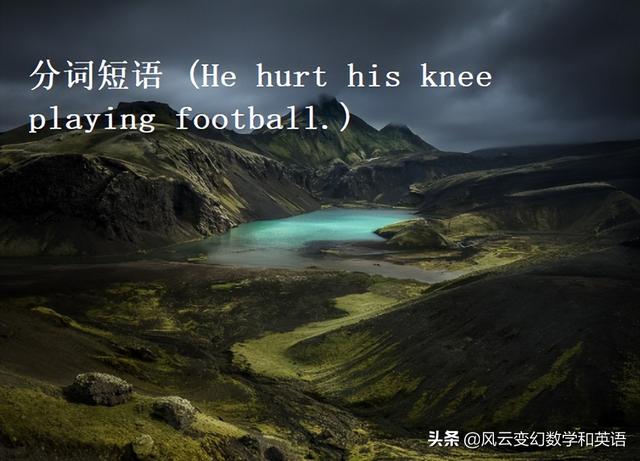分词短语 (He hurt his knee playing football.)

研究下面的例句:
Kate is in the kitchen. She’s making coffee.
我们可以说:
Kate is in the kitchen making coffee.
当两件事情发生时,你可以这样使用-ing这种现在分词短语:
A man ran out of the house shouting.
(= he ran out of the house and he was shouting)
Do something! Don’t just stand there doing nothing!
Be careful crossing the road.
当一个动作发生在另一个动作时间段时,我们也使用-ing:
Joe hurt his knee playing football. (= while he was playing)
Did you cut yourself shaving? (= while you were shaving)
你也可以说‘while doing something’ 和 ‘when doing something’:
Joe hurt his knee while playing football.
Be careful when crossing the road. (= when you are crossing)
当一个动作先于另一个动作发生时,我们用having (done)表示第一个动作:
Having found a hotel, we looked for somewhere to eat.
Having finished her work, she went home.
你也可以说after -ing:
After finishing her work, she went home.
这些结构更多地用于书面英语,而不是口语。
当我们用“Having(做了某事)”或“After(做了某事)”开始一个句子时,我们
在句子的这一部分后面加逗号(,):
Having finished her work, she went home.
你也可以用-ing来解释某事,或者解释某人做某事的原因。
这个句子通常以-ing开头:
Feeling tired, I went to bed early. (= because I felt tired)
Being unemployed, he doesn’t have much money. (= because he is unemployed)
Not having a car, she finds it diff icult to get around.
(= because she doesn’t have a car)
:
我们用having (done)表示某件事在另一件事之前完成:
Having seen the film twice, I didn’t want to see it again.
(= because I had seen it twice)
这些结构更多地用于书面英语,而不是口语。
.
当我们以-ing开头的句子(Feeling tired … / Not knowing … / Having seen … etc等),
在句子的这一部分后面写逗号。
Not knowing what to do, I called my friend to ask her advice.
,




